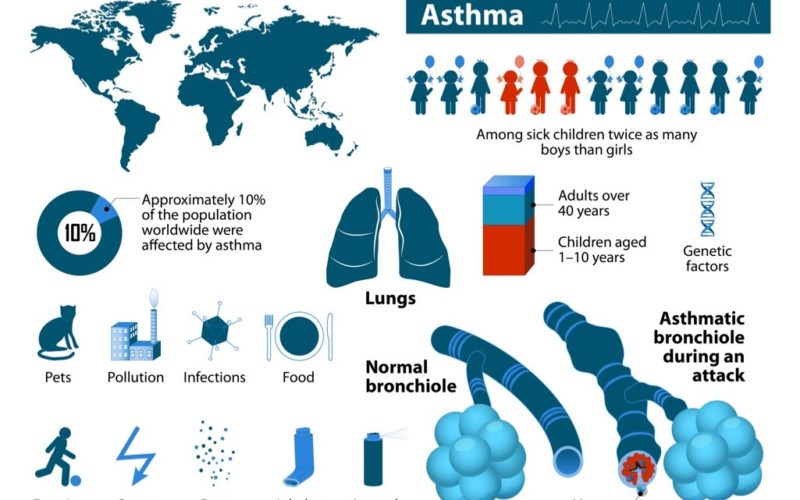
Respiratory System
Overview & Emotional Themes
The respiratory system (or ventilatory system) is the biological system that introduces respiratory gases to the interior and performs gas exchange. It’s anatomical features include airways, lungs, and the respiratory muscles.
Molecules of oxygen and carbon dioxide are passively exchanged, by diffusion, between the gaseous external environment and the blood. This exchange process occurs in the alveolar region of the lungs.
CO2 – against the Fear of Dying!
by Kora Klapp

CO2 has gotten a bad reputation these days. We tend to forget that this gas has vital functions for survival – both for the individual organism, the ecosystem, and the earth. In this article I want to focus on human beings, a widespread stress response, and its connection to some typical dis-ease patterns that science is yet attempting to decode.
Everyone knows that we breathe to get oxygen into our system, which is needed to burn glucose from our food to create the energy needed for our life functions. Oxygen from the air is taken up into our blood, tied to hemoglobin in the red blood cells which thereby change their colour from bluish to bright red. This gas exchange…
The Solution for Asthma
by John Rhodes

Asthma is the most common chronic illness in childhood, and most frequently encountered in adult women. The predominant explanation for asthma is either a hereditary one, or a multitude of risk factors pointing in different directions resulting in a non-specific singular cause.
Furthermore asthma is stated as non-curable.
This study aimed to prove that asthma could be vanquished, by using a Root Cause Analysis methodology to such an extent that it was meaningful to the person, and thus revealing a timeline of lived life where obvious traumas relating to asthma could be treated by targeted therapy using a predefined procedure of mixed alternative treatment.
Lung Diseases and their Emotional Background
Listen to doctors and therapists sharing amazing case experiences, as well as the challenges in prevention and treatment of these afflictions, on the 8. Intl META-Health Conference in Mumbai:
How Awareness can heal Asthma
Part 2 of the panel discussion with Dr Abhas Desai, Rob van Overbruggen, Dr Anton Bader, Walter Reiner and Dr Kwesi Anan Odum
Check this out when your School-Kid Coughs!

A lady brought in her five-year-old son who had very intense dry cough every night. He was perfectly fine during the day. She had taken him to many doctors and run many tests, including one for primary complex, and all tests came back negative. She told me that she had come to me as a last resort.
I Really Shouldn’t Have Snorted That!
It was a sunny Sunday afternoon – you didn’t get many of those “up North” and there I was, stuck in a stuffy Victorian hospital ward with windows that barely yielded any ventilation. I was booked in for an operation to surgically remove nasal growths. Tomorrow would belong to pre-op nerves and post-op grogginess, but today, I yearned for freedom and, perhaps, pizza and beers. My friend, Sal, was my co-conspirator; now, I just needed a permission slip from the ward staff to escape until dusk.
Two nurses and one doctor later, I’d secured a day release: one pizza, two beers max, and back by 9pm. I was first on the theatre list.
Freedom from Hay Fever

I’m a man from the coast. Life with ships and boats comes natural to me. The more, because I got hay fever – I had, that is. This is what attracted me to search for the freedom of the sea, where there is no pollen – and thereby shaped my fate.
How Breathing calms your Heart

Heart Rate Variability (HRV) is critical for (at least) three reasons:
- HRV accurately predicts your death (if we measure the HRV for twenty-four hours we can tell you when you’re going to die). 1
- HRV predicts how much energy you’ve got. 2
- HRV alters brain function – this is the key to performance. 2
When we are happily getting on with life the HRV is quietly chaotic, as each and every beat is different, but not too different. But if we are put under pressure, our HRV becomes super chaotic.
Your brain receives a signal that travels up the vagus nerve channel from the heart. In yogic terms the signal is the prana and the vagus nerve is the nadi. When you are under pressure this signal becomes chaotic, and the more pressure you are under the more chaotic it becomes.
The consequence of this…
Bio-Hacks with the Iceman
by Kora Klapp
Wim Hof, aka the Iceman, defies the limits of human capacity.
He climbed the 5895m high Mount Kilimanjaro wearing only shorts & shoes.
He ran through the Namib desert in the same attire, without drinking any water.
In wintery fiords, he swam for a distance of 66 meters under the ice.
He sat for two hours in a container full of ice and warmed it up with his body temperature.
This man is a freak. Or is he?

 META-Healthy Life articles are created by professionals and friends of META-Health International CIC, supporting individual and global health by deepening and sharing our understanding of how resilience and well-being are achieved.
META-Healthy Life articles are created by professionals and friends of META-Health International CIC, supporting individual and global health by deepening and sharing our understanding of how resilience and well-being are achieved.